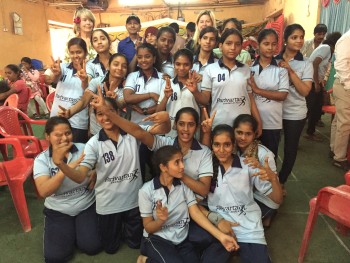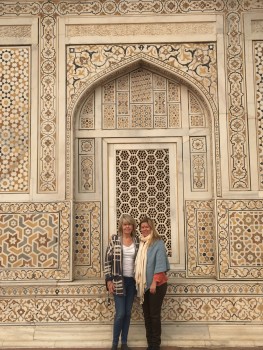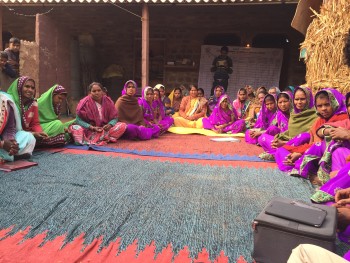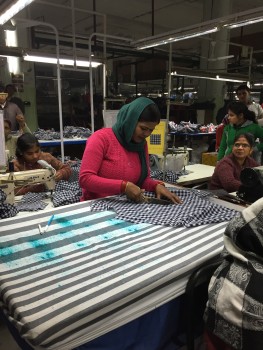
The Positive Ripple Effects of Empowering Women and Girls: A View of Three ICRW Programs Driving Change
Adolescent Girls, Adolescent Wellbeing and Youth Development, Economic Opportunity & Security, Men and Masculinities, Sports for Development
31 March 2016
Media Contact
First stop- Safe Spaces
I recently had the pleasure to travel to India with a group of friends of the International Center for Research on Women (ICRW), where we visited three programs on the ground that are helping women and girls reach their full potential.
Upon my arrival in Delhi, my bus bumped into a small village in rural Rajasthan to visit a program that is working to make public places safe for women and girls in a world where women and girls are frequently subject to violence and abuse. Making Public Spaces for Women is working with married and unmarried adolescent girls who are 12-19 years old to delay early marriage, continue their secondary school education and improve their reproductive health.
As we walked single-file by the inquisitive cattle along the narrow path into the village center, we were greeted with a striking purple flash from the collection of beautiful saris worn by a circle of nearly 30 women who gathered to share their experiences with us. “Women are strong and powerful,” was the song they sang to us as we settled down to join their circle. Men from the village – including the elderly patriarch with a long white beard and cane – gathered on the periphery of the circle and observed our translated conversations with seeming pride and more than a little curiosity. “We are learning to speak up for ourselves, especially with our husbands, to reach our goals,” one of the village trainers explained. All the men and some of the women in the village chuckled when she said this. A young woman in the village gave one of us visiting a beautiful bracelet as a token of her appreciation of our group caring about them.
Second stop – Gap Inc.’s Personal Advancement & Career Enhancement (P.A.C.E.)
Our tour bus rumbled along to a GAP factory in North Delhi, entitled Shahi Exports, Ltd., where we visited Gap Inc.’s P.A.C.E. program – one of their largest sourcing markets. Developed by ICRW and GAP, this programs seeks to help female garment workers fulfill their potential both in their personal and work lives through training for life skills, problem-solving and financial literacy. The goals of PACE are to help these women move into management and supervisory roles at the factory, reduce job attrition and also improve their personal lives.
The male factory owners and managers, female P.A.C.E. trainers, and about 35 female garment workers greeted our group with an opening ceremony in which we received blessings, flowers, and a description of the program. We witnessed the ripple effect of P.A.C.E. in the home demonstrated by five garment workers in an in-vivo role play of a wife gently and effectively asserting herself in the home with her husband, mother-in-law and 11-year-old daughter. Indeed, one of the garment workers shared that she had started working in the factory in 2008, was trained by P.A.C.E., had been promoted to supervisor in 2011, and was committed to her work. When asked how the training had affected her home life, she proudly asserted that she had been able to stand up to her domineering mother-in law: “I told her – look who brings in the money and still does a lot of housework and you treat your son better than you treat me – it’s NOT fair.” Her mother-in-law thought about it for a few days and then started to treat her daughter-in-law with more appreciation and respect.
Third Stop – Parivartan for Girls
 Located in a community center in one of the many slum areas of Mumbai, the Parivartan Plus program is helping create a safe and enabling environment to help girls thrive. The program provides adolescent girls, 12-16 years old, the opportunity to play an organized, team-based, contact sport, called “Kabaddi,” in which they are coached by community leaders and young adult female mentors. The program objectives are to improve each girl’s self-confidence, comfort with her athletic abilities and her body, and aspiration to sustain her education, as well as to help her adopt gender-equitable attitudes and express zero tolerance of sexual harassment and violence. A girl on each team gave us a long-stemmed red rose, as she escorted us to the place where we watched the two teams compete in kabaddi (pictured below). After the exciting, tough match, we gathered in small groups to talk with the proud, animated girls and their eager, supportive mentors, community leaders, and parents.
Located in a community center in one of the many slum areas of Mumbai, the Parivartan Plus program is helping create a safe and enabling environment to help girls thrive. The program provides adolescent girls, 12-16 years old, the opportunity to play an organized, team-based, contact sport, called “Kabaddi,” in which they are coached by community leaders and young adult female mentors. The program objectives are to improve each girl’s self-confidence, comfort with her athletic abilities and her body, and aspiration to sustain her education, as well as to help her adopt gender-equitable attitudes and express zero tolerance of sexual harassment and violence. A girl on each team gave us a long-stemmed red rose, as she escorted us to the place where we watched the two teams compete in kabaddi (pictured below). After the exciting, tough match, we gathered in small groups to talk with the proud, animated girls and their eager, supportive mentors, community leaders, and parents.
One girl said, “I now speak up more than I ever did, in school and at home.” Another girl added, “I am not afraid to go outside anymore and walk around in public.” Another said, “I hope my daughter will be as good a kabaddi player as I am.” Finally, one mother with her daughter, pictured below, proudly informed us, “After playing kabaddi, my daughter made me take swimming lessons. Now I can swim.”
 Sprinkled throughout our visit, we encountered remarkably beautiful cultural sites, tasted delectable cuisine, including a host of tikkas, prawn vindaloo, vegetable samosa, eggplant bhaarta, and lamb curries – and enjoyed wearing gorgeous saris, pashminas, and salwar kameezes. Indeed, the trip was a richly colored, silken tapestry of sights, tastes, and compelling stories of growth and transformation in the lives of girls and women. From empowering them with the skills they need to develop both in their personal and professional lives to helping them reclaim public spaces, these programs are truly driving change – leading to indelible ripple effects in families and communities.
Sprinkled throughout our visit, we encountered remarkably beautiful cultural sites, tasted delectable cuisine, including a host of tikkas, prawn vindaloo, vegetable samosa, eggplant bhaarta, and lamb curries – and enjoyed wearing gorgeous saris, pashminas, and salwar kameezes. Indeed, the trip was a richly colored, silken tapestry of sights, tastes, and compelling stories of growth and transformation in the lives of girls and women. From empowering them with the skills they need to develop both in their personal and professional lives to helping them reclaim public spaces, these programs are truly driving change – leading to indelible ripple effects in families and communities.


